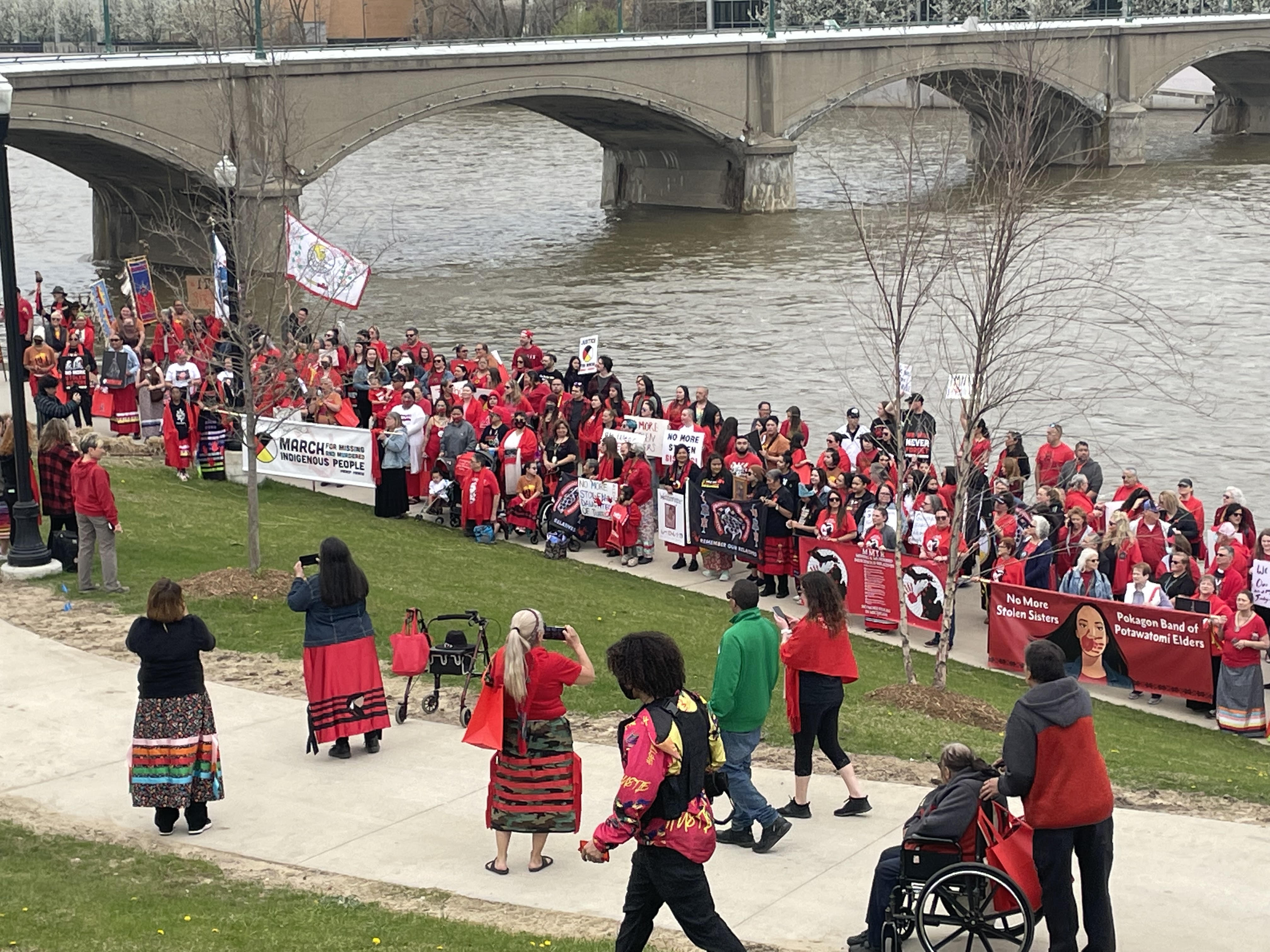
- Details
- By Levi Rickert
GRAND RAPIDS, Mich. — Several hundred Anishinaabeg and supporters gathered in Ah-Nab-Awen Park on the shores of the Owashtinong (Grand River) in downtown Grand Rapids, Mich. on Thursday, May 5, 2022 to observe Missing and Murdered Indigenous Persons Awareness Day.
Above the hums of traffic from a nearby freeway as travelers went about their daily business, speakers spoke about the tragic losses encountered in Indian Country of missing and murdered Indigenous persons. The vast majority of people in the crowd wore red in observance of those lost across Indian Country.
“The problem with missing and murdered Indigenous women has been an epidemic since 1492,” Melissa Isaac (Saginaw Chippewa Indian Tribe), who was an invited guest in first lady Jill Biden’s box during the State of the Union, who served as the emcee of the event said.
The event in Grand Rapids was only one events held nationwide on Thursday to bring awareness to the sad reality that Native American people go missing or are murdered at rates that far surpass their White counterparts.
Michigan Governor Gretchen Whitmer sent a proclamation that was read by Melissa Kiesewetter, Native American specialist at the Michigan Department of Civil Rights. Grand Rapids City Commissioner Joe Jones read a proclamation from the City of Grand Rapids.
On Wednesday, President Joe Biden signed a presidential proclamation to recognize Missing and Murdered Indigenous Persons Awareness Day.
“For far too long, justice for Indigenous communities has been elusive. We must improve our investigations to resolve missing or murdered cases while supporting victims and their families,” President Biden said.
One of the most poignant moments of the day came when the parents of Nagohns-ba Massey, a citzen of the Little Traverse Bay Bands of Odawa Indians, who was stabbed to death in Mt. Pleasant, Mich. in November 2020, spoke. She was only 21 when she was tragically murdered on the Isabella Indian Reservation in Mt. Pleasant.
"She was a MMIW advocate and a water protector. She had her whole life ahead of her," Melissa Pamp, Massey's mother, told the crowd. "When something like this happens, it affects us all, as we all know someone, at least one person, who is has been a victim of MMIW. I would encourage you to use your voice. Seek justice and show up when needed to help."
"Use tribal sovereignty to banish perpertrators from your tribal lands," Pamp said. "I encourage tribal leadership to get involced. I was fortunate enough to have some tribal leadership who were supportive of a life sentence (for the person who was convicted of killing her daughter).
"I am sorry it took all this to get involved, We do everything we can do to stop this so that other families don't have to go through what we did," Miengun Pamp, Massey's stepfather said.
After other speakers, the crowd marched through downtown Grand Rapids to bring awareness of the tragedy of missing and murdered Indigenous persons.
The event was sponsored by the three Potawatomi tribes located in southwest Michigan: Nottawasippi Huron Band of Potawatomi, Gun Lake Tribe, and Pokagon Band of Potawatomi.
-
 Gun Lake Tribal Councilor Phyliss Davis on left. Gun Lake Tribal Councilor Phyliss Davis on left.
Gun Lake Tribal Councilor Phyliss Davis on left. Gun Lake Tribal Councilor Phyliss Davis on left. -
 Gun Lake Tribe's Ogitch-E-Daa Color Guard Gun Lake Tribe's Ogitch-E-Daa Color Guard
Gun Lake Tribe's Ogitch-E-Daa Color Guard Gun Lake Tribe's Ogitch-E-Daa Color Guard -
 Local drum group Local drum group
Local drum group Local drum group -
 Grand Rapids City Commissioner Joe Johns Grand Rapids City Commissioner Joe Johns
Grand Rapids City Commissioner Joe Johns Grand Rapids City Commissioner Joe Johns -
 Native Potawatomi youth from Mattawan, Mich. Native Potawatomi youth from Mattawan, Mich.
Native Potawatomi youth from Mattawan, Mich. Native Potawatomi youth from Mattawan, Mich. -
 Signs help tell the story of the Missing and Murdered Indigenous Persons crisis. Signs help tell the story of the Missing and Murdered Indigenous Persons crisis.
Signs help tell the story of the Missing and Murdered Indigenous Persons crisis. Signs help tell the story of the Missing and Murdered Indigenous Persons crisis. -
 Melissa Isaac Melissa Isaac
Melissa Isaac Melissa Isaac -
 Marchers arrive back from walk through downtown Grand Rapids. Marchers arrive back from walk through downtown Grand Rapids.
Marchers arrive back from walk through downtown Grand Rapids. Marchers arrive back from walk through downtown Grand Rapids. -
 Part of group photo. Part of group photo.
Part of group photo. Part of group photo.
https://nativenewsonline.net/currents/hundreds-attend-missing-and-murdered-indigenous-persons-event-in-grand-rapids#sigProId022fe3f000
More Stories Like This
Native News Weekly (August 25, 2024): D.C. BriefsNavajo Nation Mourns the Passing of Former Vice President Rex Lee Jim
Deb Haaland Earns Endorsement From Communications Workers of America Local 7076
University Soccer Standout Leads by Example
Two Native Americans Named to Democratic Congressional Campaign Committee's“Red to Blue” Program
Help us defend tribal sovereignty.
At Native News Online, our mission is rooted in telling the stories that strengthen sovereignty and uplift Indigenous voices — not just at year’s end, but every single day.
Because of your generosity last year, we were able to keep our reporters on the ground in tribal communities, at national gatherings and in the halls of Congress — covering the issues that matter most to Indian Country: sovereignty, culture, education, health and economic opportunity.
That support sustained us through a tough year in 2025. Now, as we look to the year ahead, we need your help right now to ensure warrior journalism remains strong — reporting that defends tribal sovereignty, amplifies Native truth, and holds power accountable.
 The stakes couldn't be higher. Your support keeps Native voices heard, Native stories told and Native sovereignty defended.
The stakes couldn't be higher. Your support keeps Native voices heard, Native stories told and Native sovereignty defended.
Stand with Warrior Journalism today.
Levi Rickert (Potawatomi), Editor & Publisher

